TippingPoint: Melbourne
admin | November 2, 2010.
On the 29th and 30th of October, the arts and science communities came together for the first time in Australia under the banner of TippingPoint. Using a framework established in the UK, TippingPoint aims to bridge the gap between climate change knowledge and action by encouraging collaboration between these two distinct worlds.
Being neither a “scientist” nor an “artist”, I was placed in the “funding” group (much to my confusion). Unfortunately the label was in no way reflective of my ability to financially support the endeavours of other participants. As someone external to the inner processes of both worlds, I learnt that both “artists and scientists work on hunches and never know when to stop; they essentially have the same process that stems from passion”. This was evidenced throughout the conversations I had with highly enthused people.
As far as conferences go, TippingPoint is more akin to structured conversations than anything else. There were few keynote speakers of the “expert” variety, instead there was a focus on harnessing the collective knowledge of the audience.
That said, the conference did begin with a brief overview of “climate science from the frontline” from David “the scariest man you will ever meet” Karoly. Having heard Karoly present the findings of the IPCC’s 4th Assessment Report on Climate Change many times before, it did not surprise me to learn that “global warming has not stopped and the planet is still warming”. However, it was the first time that he summed up the Report with an apt haiku:
“Climate is warming;
Poor will suffer, rich may cope.
We are causing it!
It will get much worse!”
Tim Jarvis followed by sharing personal stories that reiterated the importance of weaving (climate related) messages into stories. The past decade has demonstrated how scary stories do not communicate very well. People move from climate change despair to despondency, completely skipping over the part where they take action.
Other speakers on the first day included Alison Tickel of Julie’s Bicycle who spoke via Skype during the “Provocation” session. Julie’s Bicycle was of high interest and relevance to the audience, given that the group specialises in carbon management for events in the arts industry.
The remainder of the day was spent in self-directed discussions on topics ranging from “international success as a sustainable artist”, “communicating science through the arts” to “forming long-lasting partnerships across different sectors” etc. I personally attended “how to use media as a tool for social change”, which led to a few interesting revelations such as how there is no direct psychological research proving that parents are more likely to be concerned with climate change. Or how a participant from the UK thought Australia’s Today Tonight was actually satirical journalism when she first watched…
Day Two started with another “Provocation”, which proved to be an effective method of waking up the audience members not used to early Saturday mornings. Panelists Nigel Jamieson, Patrick Jones, Michael Kantor, Clinton Nain and Lucy Neal (via Skype) discussed their journeys and struggles to more sustainable (performance related) practices.
Nain, an indigenous artist, was the most audience provoking panelist who instigated many heated conversations during the tea break. As a “custodian of the land for thousand of years”, Nain felt that the colonisers and current Western lifestyle choices were to blame for “my people, in Cape York, sweeping the water out of their houses”. Such comments divided the audience, as most recognised the importance of indigenous rights, yet did not want to fall victim to another blame game.
Saturday’s self-directed conversations were spent discussing possible projects that could arise from TippingPoint. Having sat in on the “illegal project ideas” group, I’m not entirely sure if I can communicate any of those ideas and serve them justice. Nor were they all suitable for public consumption. Fortunately, I did listen in on two other projects that are share-worthy (read: legal). The first was an art project to be held simultaneously to the climate change negotiations (COP17) in South Africa next year. The second project was an address phone book dump in the middle of Federation Square which would form part of a larger campaign to end the compulsory publication of the White and Yellow Pages.
Being a conference half-filled with creatives, it was no surprise that the participants would be expected to (and reveled in) creating their own “performance” pieces. All participants were asked to share a “precious object” that symbolised climate change for them, and to work with five or so other people in constructing a 50 word piece of prose about climate change. Below are two examples that stick out in my mind:
On Monday, I changed all my light globes.
On Tuesday, I switched off everything at the power point.
On Wednesday, I stuck the timer back on the shower wall.
On Thursday, I walked to work.
On Friday, I turned down the thermostat.
On Saturday, I voted.
On Sunday, I looked around, frustrated and realised that I wasn’t even halfway there.
The precious object that I brought today is my busyness. This busyness consumes me all the time, to the point where I don’t have the time to think about anything other than my day- today life. I don’t have time to think about climate change or to act on climate change. Even though I know I should.
Similar to any conference that I have ever been too, everyone enjoyed the conversations that could be had with the other participants. TippingPoint did a great job in capitalising on this with 80% of the conference dedicated to these conversations, that led to different things for different people.
TippingPoint also happens to be a travelling conference. Over the next fortnight, it will visit Sydney and Brisbane not only to a new audience but, featuring new speakers. The conversations will definitely be different, so follow along at #TPOZ10 on Twitter!
Photos via TippingPoint Australia.






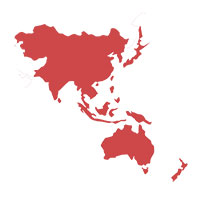
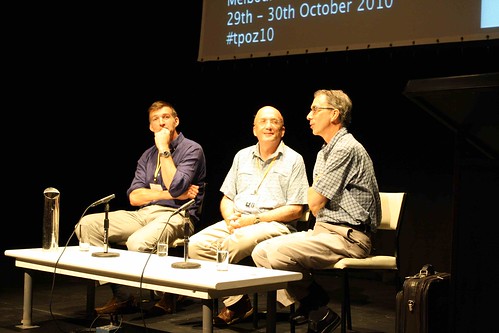
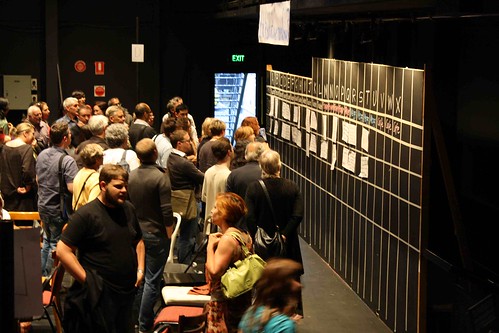
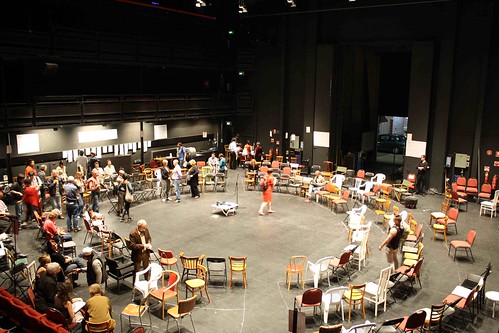

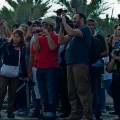
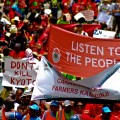



comment